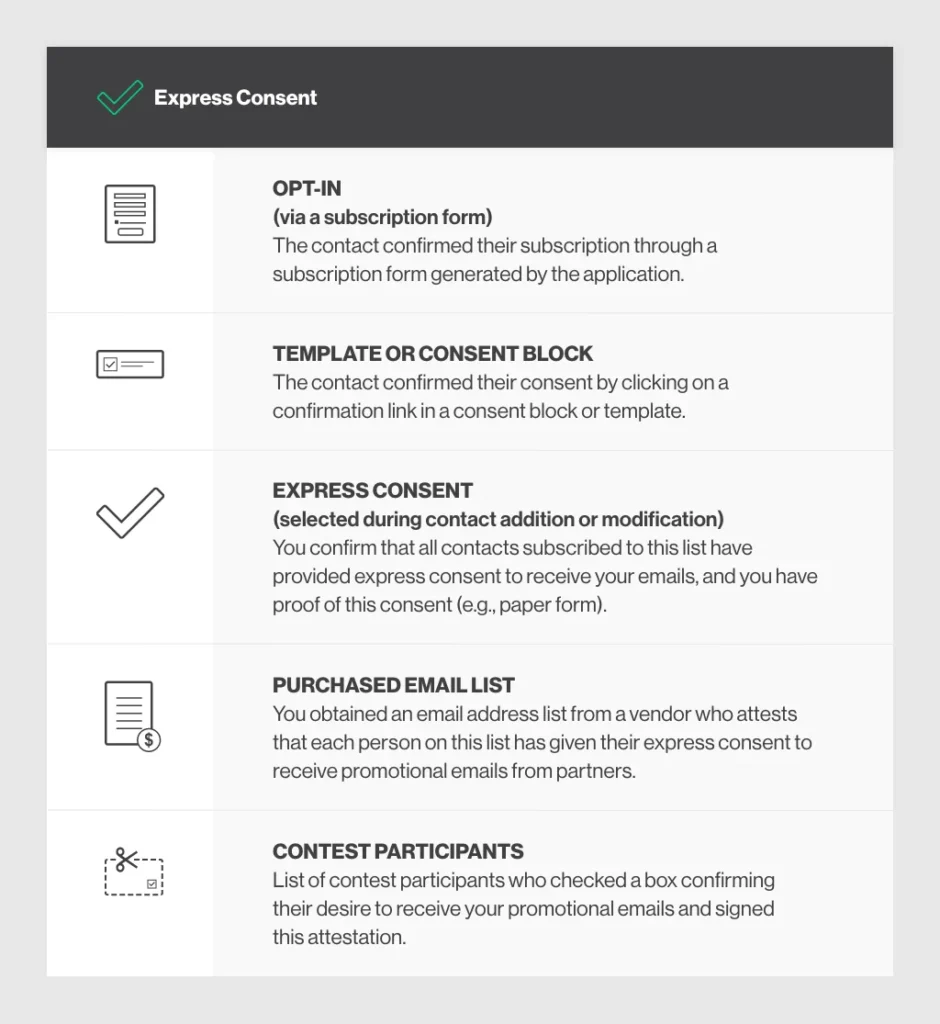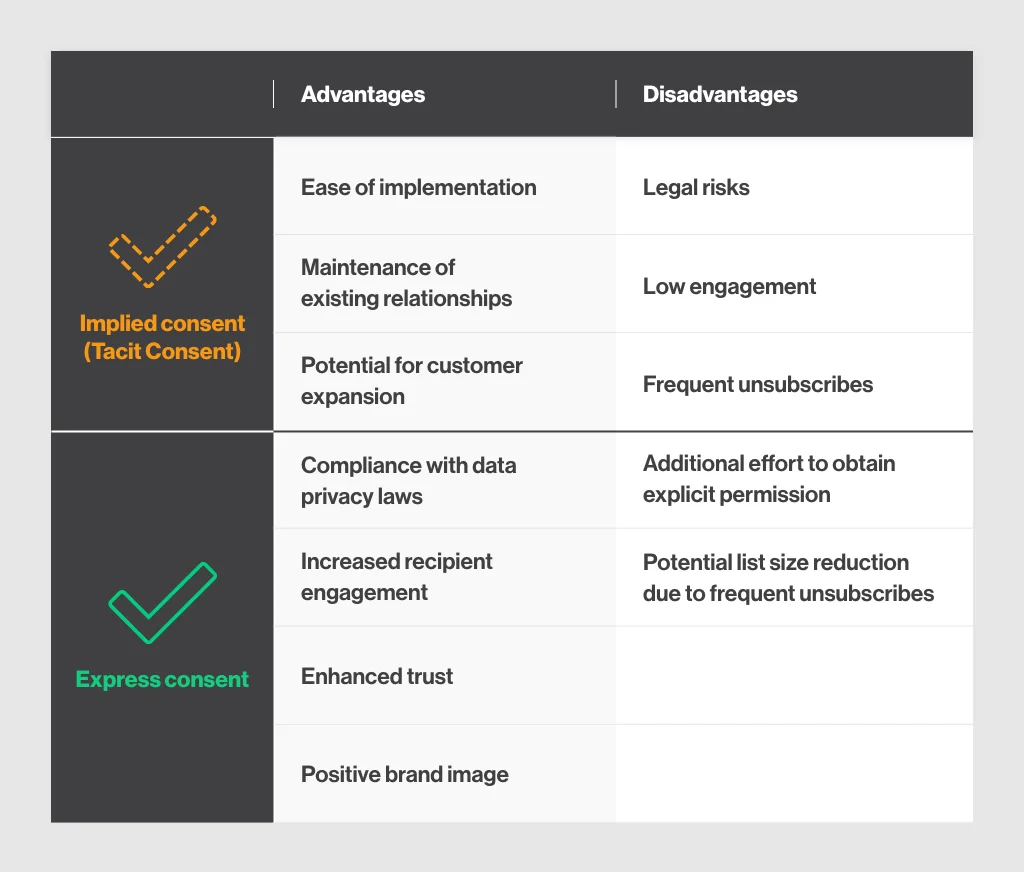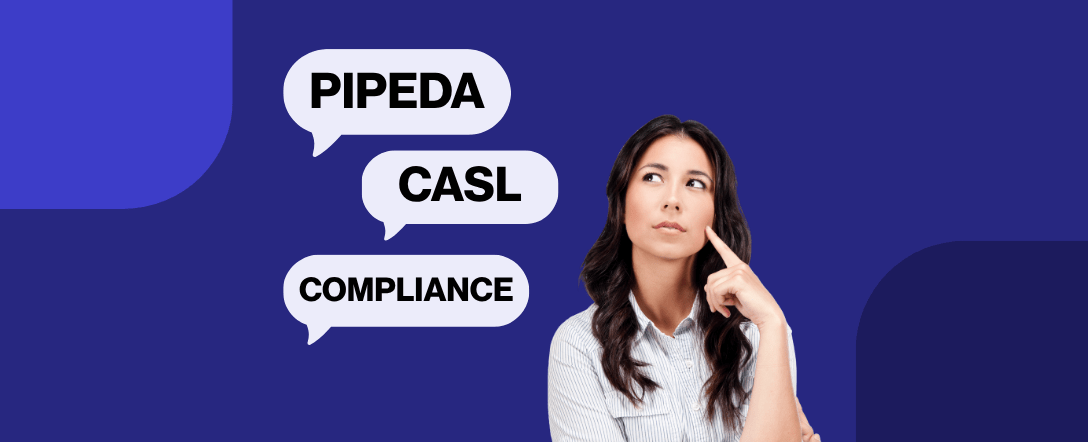CASL and PIPEDA compliance are important issues for every Canadian business owner and marketer. Personal data protection and email marketing compliance can seem daunting. However, it’s simpler than it seems when you have the right resources.
We recently hosted a webinar with the Office of the Privacy Commissioner of Canada (OPC). Two advisors from the OPC shared insights on two key laws, and we have turned those into this complete guide on CASL and PIPEDA for Canadian marketers.
Email Marketing Laws in Canada
What is CASL?
The core principle of Canada’s Anti-Spam Legislation, also known as CASL, is respect.
You need clear permission from Canadians before sending them commercial electronic messages (CEMs). This includes marketing messages, emails, texts, or social media DMs.
Here’s what CASL requires for your marketing emails:
- Consent: You can’t just add someone to your list because they shared their email somewhere. Under CASL, you need clear, affirmative consent. It’s an opt-in model, not opt-out.
- Identification: Your message must clearly identify who you are and provide your valid contact information
- Easy unsubscribe: Every email must include a simple, no-questions-asked unsubscribe mechanism
- Record keeping: Keep proof of consent with clear dates to protect your business
- No deceptive practices: Avoid misleading subject lines or falsified sender information to build trust and avoid penalties.
The stakes are high for those who are not compliant. CASL violations can lead to fines up to $1 million for individuals and $10 million for businesses. But beyond penalties, compliance builds trust and safeguards your brand reputation in a crowded digital marketplace.
Using an email marketing platform that is tailored for CASL compliance, like Cyberimpact, can automate much of this process. Like so, you will never send a message without valid consent.
What is Express Consent?
Express consent is the gold standard for CASL compliance. This means someone has actively and clearly agreed to receive commercial messages from you, either verbally or in writing.
To obtain valid express consent, your request must include specific information:
- Clear purpose: Explain why you’re asking for consent and what types of messages the recipient will receive.
- Your identity: Include your business name and contact information.
- Simple language: Make sure the request is easy to understand without legal jargon.
- Opt-in mechanism: The recipient must take a positive action, like checking an empty box or clicking a confirmation link. Pre-checked boxes don’t count.
[example of newsletter form that is CASL compliant]
For example, if a customer signs up for your newsletter through a form on your website where they actively click “Yes, I want to receive emails,” that’s express consent.
The best part about express consent is that there’s no expiration date. Once someone gives you express consent, you can continue sending messages until they unsubscribe or withdraw their permission.
Nevertheless, keep records of when and how you obtained this consent, as you carry the burden of proof if questioned. When you use a tool like Cyberimpact, which has embedded consent management, you have this information easily accessible for all of your contacts.

What is Implied Consent?
Implied consent is permission based on an existing relationship or specific circumstances. While convenient, implied consent is time-limited and comes with stricter conditions.
You may have implied consent in these situations:
Existing Business Relationship (EBR)
If someone has purchased a product or service from you, leased goods, or accepted a business opportunity, you have implied consent for two years from the date of that transaction.
If someone inquired about your products or services, you have implied consent for six months from the date of inquiry.
Existing Non-Business Relationship
If you’re a registered charity, political party, or club, and someone has donated, volunteered, or held a membership with you, implied consent may apply. For memberships and subscriptions, the two-year period begins when the relationship ends.
Conspicuous Publication
If someone has publicly posted their email address on a website without indicating they don’t want unsolicited messages, and your message relates to their professional role or business duties, you may have implied consent.
Business Card Exchange
When someone gives you their business card at a networking event or trade show, this can create implied consent. It’s a good practice to document the interaction by mentioning the conversation and date in a follow-up email.
Keep in mind that implied consent is temporary. You should use this window to build the relationship and request express consent before the implied consent expires. Each new transaction with a customer resets the two-year clock for that existing business relationship.
It is the sender’s responsibility to prove they have consent. Therefore, it’s essential to keep detailed records of how you established implied consent, including dates, transaction details, or documentation of the relationship.

PIPEDA: Protecting the Data Your Customers Trusted You With
If CASL is about consent, PIPEDA is about privacy. Also, the responsibility of handling personal information collected during business activities.
When your business collects emails and names for marketing purposes, the law sets clear expectations:
- Tell people upfront why you are collecting their data
- State how that data will be used
- Protect the data with appropriate security safeguards
- Allow customers to access or correct their personal information
- Let customers withdraw consent anytime without hassle
Failing to comply risks customer trust and damages your long-term business relationships. PIPEDA applies where personal information crosses provincial or international lines. Abiding by it means staying transparent and accountable with your data practices.
Ten Fair Information Principles for Compliance
The PIPEDA law is built on ten principles that guide how businesses handle personal information:
- Accountability: Your organization is responsible for personal information under its control. Designate someone to oversee compliance.
- Identifying Purposes: Tell people why you’re collecting their information before or when you collect it. Be specific about how you’ll use email addresses and names.
- Consent: Get meaningful consent for collection, use, and disclosure of personal information. The form of consent should match the sensitivity of the information.
- Limiting Collection: Only collect information that’s necessary for the purposes you’ve identified. Don’t gather extra data “just in case”.
- Limiting Use, Disclosure, and Retention: Use personal information only for the purposes you stated when collecting it. Keep it only as long as necessary.
- Accuracy: Make sure the personal information you use is accurate, complete, and up to date. Incorrect information can lead to poor decisions that affect your customers.
- Safeguards: Protect personal information with security measures appropriate to its sensitivity. This includes physical, organizational, and technological safeguards.
- Openness: Make information about your policies and practices for handling personal information readily available. Create a clear privacy policy.
- Individual Access: Give individuals access to their personal information upon request. Let them challenge its accuracy and completeness.
- Challenging Compliance: Provide procedures for customers to challenge your compliance with these principles. Make it easy to file complaints and address concerns.
How CASL and PIPEDA Work Together
While CASL focuses on consent before sending commercial messages, PIPEDA governs how you collect, use, store, and protect the personal information within those messages.
Think of CASL as controlling the permission to communicate, while PIPEDA controls how you handle the data behind that communication.
For example, when someone signs up for your newsletter, CASL requires their consent to send marketing emails. PIPEDA requires you to explain why you’re collecting their email address, keep it secure, use it only for stated purposes, and allow them to access or delete their information upon request.
Both laws emphasize transparency and respect for individuals’ privacy. Using a platform designed for Canadian compliance helps you meet both sets of requirements without confusion.
How Canadian Businesses Can Master PIPEDA Compliance
Understanding laws is one thing; putting them into practice can be overwhelming. Here are proven strategies to keep your marketing on the right side of the law:
- Segment your email list by type of consent: Keep track of who gave express consent, implied consent, or needs re-consent.
- Maintain comprehensive audit trails: Automated platforms can log consents, date stamps, and unsubscribe requests.
- Use clear and visible consent forms: Avoid pre-checked boxes and make it obvious what subscribers are signing up for.
- Regularly clean your email list: Remove inactive contacts and those who have unsubscribed.
- Train your team: Make sure everyone involved in marketing understands the importance of compliance and their role in it.
- Use Canadian email platforms: Choose solutions with tools to easily navigate CASL and PIPEDA, like Cyberimpact, which simplifies consent management and helps you avoid costly mistakes.
To learn more, watch our full webinar with the Office of the Privacy Commissioner of Canada. They explain in detail how the legislation works and how it affects businesses across the country. The presentation also features practical examples and a walkthrough of how Canadian businesses can stay compliant with Cyberimpact’s tools.
Subscribe to our newsletter to learn about upcoming webinars
Why Compliance Matters for Canadian Businesses
Choosing a Canadian email marketing provider means:
- Your data stays protected under Canadian laws like CASL and PIPEDA
- Customer information is handled with respect for Canadian privacy principles
- You receive customer support from a local team that understands your business needs
- You contribute to the local economy by supporting Canadian tech companies
Regulations are meant to support and protect your business and clients. So don’t let them hold you back. Use tools designed to help Canadian businesses get it right, focus on building real connections via email, and stay onside with the law.
The Cyberimpact team is available to support you with expert advice, compliance features, and a platform built for the needs of Canadian marketers.
Talk to our team about making the switch to Cyberimpact.
